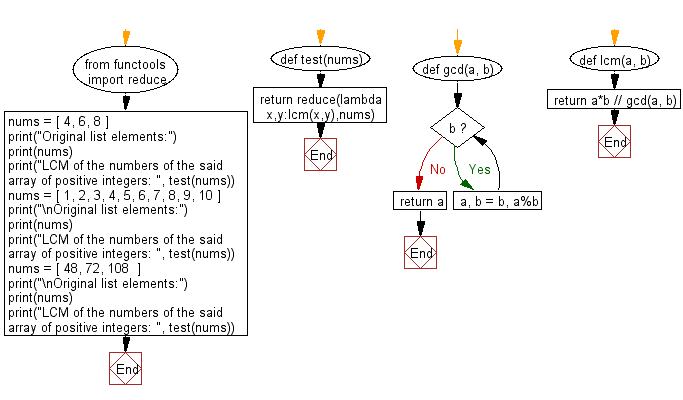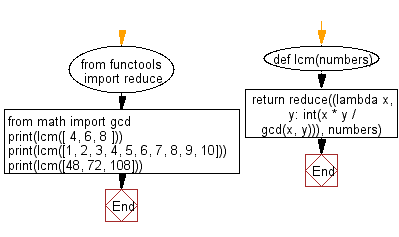Python: Least Common Multiple (LCM) of more than two numbers
LCM of Multiple Numbers
Write a Python program that calculates the Least Common Multiple (LCM) of more than two numbers. The numbers should be taken from a given list of positive integers.
From Wikipedia,
In arithmetic and number theory, the least common multiple, lowest common multiple, or smallest common multiple of two integers a and b, usually denoted by lcm(a, b), is the smallest positive integer that is divisible by both a and b. Since division of integers by zero is undefined, this definition has meaning only if a and b are both different from zero. However, some authors define lcm(a,0) as 0 for all a, which is the result of taking the lcm to be the least upper bound in the lattice of divisibility.
Sample Solution-1:
Python Code:
# Import the 'reduce' function from the 'functools' module.
from functools import reduce
# Define a function 'test' that calculates the LCM (Least Common Multiple) of a list of numbers.
def test(nums):
# Use the 'reduce' function to apply the 'lcm' function cumulatively to the elements of 'nums'.
return reduce(lambda x, y: lcm(x, y), nums)
# Define a function 'gcd' that calculates the Greatest Common Divisor (GCD) of two numbers.
def gcd(a, b):
# Use the Euclidean algorithm to find the GCD of 'a' and 'b'.
while b:
a, b = b, a % b
return a
# Define a function 'lcm' that calculates the Least Common Multiple (LCM) of two numbers.
def lcm(a, b):
# Calculate the LCM using the formula: LCM(a, b) = (a * b) / GCD(a, b).
return a * b // gcd(a, b)
# Test cases with different lists of positive integers.
nums = [4, 6, 8]
print("Original list elements:")
print(nums)
print("LCM of the numbers of the said array of positive integers: ", test(nums))
nums = [1, 2, 3, 4, 5, 6, 7, 8, 9, 10]
print("\nOriginal list elements:")
print(nums)
print("LCM of the numbers of the said array of positive integers: ", test(nums))
nums = [48, 72, 108]
print("\nOriginal list elements:")
print(nums)
print("LCM of the numbers of the said array of positive integers: ", test(nums))
Sample Output:
Original list elements: [4, 6, 8] LCM of the numbers of the said array of positive integers: 24 Original list elements: [1, 2, 3, 4, 5, 6, 7, 8, 9, 10] LCM of the numbers of the said array of positive integers: 2520 Original list elements: [48, 72, 108] LCM of the numbers of the said array of positive integers: 432
Explanation:
Here is a breakdown of the above Python code:
- LCM Function (test function):
- The test function takes a list of positive integers as input and calculates the LCM of the numbers.
- It uses the "reduce()" function to apply the "lcm()" function cumulatively to the elements of the input list.
- GCD and LCM Functions (gcd and lcm functions):
- The "gcd()" function calculates the Greatest Common Divisor (GCD) of two numbers using the Euclidean algorithm.
- The "lcm()" function calculates the Least Common Multiple (LCM) of two numbers using the formula: LCM(a, b) = (a * b) / GCD(a, b).
Flowchart:

Sample Solution-2:
Use functools.reduce(), math.gcd() and lcm(x,y) = x * y / gcd(x,y) over the given list.
Python Code:
# Import the 'reduce' function from the 'functools' module.
from functools import reduce
# Import the 'gcd' function from the 'math' module.
from math import gcd
# Define a function 'lcm' that calculates the Least Common Multiple (LCM) of a list of numbers.
def lcm(numbers):
# Use the 'reduce' function to apply the lambda function cumulatively to the elements of 'numbers'.
# The lambda function calculates the LCM using the formula: LCM(a, b) = (a * b) / GCD(a, b).
return reduce((lambda x, y: int(x * y / gcd(x, y))), numbers)
# Test cases with different lists of positive integers.
print(lcm([4, 6, 8]))
print(lcm([1, 2, 3, 4, 5, 6, 7, 8, 9, 10]))
print(lcm([48, 72, 108]))
Sample Output:
24 2520 432
Explanation:
Here is a breakdown of the above Python code:
- LCM Function (lcm function):
- The "lcm()" function takes a list of numbers as input and calculates the LCM of the numbers.
- It uses the "reduce()" function to apply the lambda function cumulatively to the elements of the input list.
- The lambda function calculates the LCM using the formula: LCM(a, b) = (a * b) / GCD(a, b).
Flowchart:

For more Practice: Solve these Related Problems:
- Write a Python program to compute the least common multiple (LCM) of a list of positive integers using the gcd function.
- Write a Python program to calculate the LCM of multiple numbers by iteratively applying the LCM formula pairwise.
- Write a Python program to find the LCM of an array of integers using the reduce function and math.gcd.
- Write a Python program to determine the smallest common multiple for a list of numbers using a pairwise LCM approach.
Go to:
Previous: Write a Python program to alternate the case of each letter in a given string and the first letter of the said string must be uppercase.
Next: Write a Python program to reverse all the words which have odd length.
Python Code Editor:
Have another way to solve this solution? Contribute your code (and comments) through Disqus.
What is the difficulty level of this exercise?
Test your Programming skills with w3resource's quiz.
